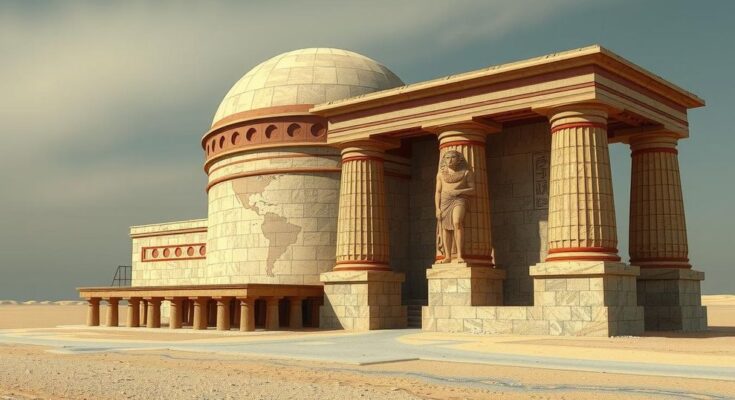Archaeological research reveals that ancient Egyptians developed systematic drought responses, including increasing grain production and breeding resilient livestock, to mitigate the impacts of significant droughts. The Late Bronze Age drought not only affected agricultural outputs, contributing to the economic collapse of several civilizations but also serves as a historical lesson about the effects of climate crises on societies.
Recent archaeological studies conducted in Israel have unveiled insights into the ancient Egyptians’ methods of preparing for climate-related challenges. According to research published in the journal Egypt and the Levant by experts from Tel Aviv University, pharaohs implemented strategies to increase grain production in more fertile regions as a preventive measure against impending droughts. The ancient administrative system prioritized distributing surplus food to ensure social and political stability across the empire. Furthermore, efforts were made to cultivate more resilient livestock capable of surviving drier conditions.
The Late Bronze Age (circa 1250 to 1100 B.C.E.) witnessed extreme climatic shifts in the Middle East and North Africa, characterized by droughts that devastated agricultural outputs and triggered economic collapse in Egypt. The drought not only decimated crops but also significantly impacted livestock, further straining the population and economy dependent on the Nile River’s resources. The extent of this climatic crisis extended to contemporary regions such as Syria, as documented by climate scientists and archaeologists.
The drought has been noted as a major factor contributing to the broader phenomenon known as the Bronze Age Collapse, which resulted in the disappearance of numerous prosperous societies throughout the Mediterranean. This epoch is marked by significant advancements, including the creation of a copper-tin alloy and the emergence of writing and trade networks shared among civilizations such as the Egyptians, Babylonians, and Mycenaeans. The collapse of these communities exemplifies the catastrophic impacts that climate crises can impose on highly developed societies.
As delineated in scholarly discussions, various advanced civilizations, including the Hittite Empire and the Mycenaean culture, faltered under the pressures of drought and its resultant socio-economic challenges, ultimately giving way to the territorial kingdoms of the Iron Age. The complexities surrounding ancient agricultural practices, particularly the cultivation of drought-resistant wheat and efficient grain transportation via the Nile, played pivotal roles during these catastrophic times. As water levels fluctuated, the stability of the tax system was also affected, leading to centralized grain storage initiatives aimed at mitigating losses from repeated flooding failures. Professor Eric H. Cline of George Washington University reflects on these historical events, asserting that contemporary societies can learn from past drought-induced agricultural failures and their far-reaching implications.
The article delves into the historical context of ancient Egyptian civilization during climate crises, specifically the Late Bronze Age droughts that significantly impacted agriculture and economies. Understanding the relationship between climate events and sociopolitical stability provides critical insights into the measures adopted by ancient pharaohs to sustain their civilization amidst environmental challenges. The research emphasizes the role of agriculture as the bedrock of ancient societies and highlights the long-term repercussions of climatic shifts, contributing to the eventual collapse of several prominent empires in the region.
In summary, the archaeological findings illuminate the proactive measures ancient Egyptians undertook in the face of climate challenges, particularly through increased grain production and resilient livestock breeding. The Late Bronze Age drought serves as a cautionary example of how environmental crises can lead to the collapse of established societies. Lessons drawn from these ancient civilizations offer valuable reflections on the dynamics between climate change and human societal resilience, pertinent to contemporary discussions surrounding environmental sustainability.
Original Source: knewz.com




